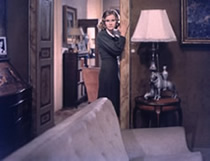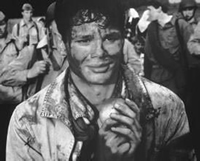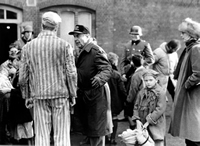 Imaginary
Witnesses:
Imaginary
Witnesses:
Hollywood and European Directors Focus on the Holocaust
Presented by
The National Center for Jewish Film and Goethe -Institut Boston
and Brandeis University,
The Wasserman Fund
The Center for German and European Studies
The Tauber Institute for the Study of European Jewry
The Film Studies Program
Near Eastern and Judaic Studies Department
Opening with the premiere of a new documentary about Hollywood holocaust films,
featuring films of Steven Spielberg, and Sidney Lumet, as well as footage from
the National Center for Jewish Film archive, this series continues with an array
of award winning features by some of the most talented European directors including
Wajda, Szabo, Weisz, and Holland. Seven of the films were produced by Artur
Brauner, a survivor who lost 49 relatives when the Nazis invaded his hometown
of Lodz, Poland.
Brauner’s first film honoring victims of the Nazi era, Morituri (1948),
was released when the German public was not yet ready for critical introspection.
Discouraged by this, Brauner focused on light-hearted, popular entertainment
films, becoming the most successful independent producer in Europe with over
250 films to his credit. In the 1960s, changes in the socio-political climate
enabled Brauner to return to this topic, which lay close to his heart. The Goethe-Institut
Boston is providing these outstanding films. Additional films by Vittorio De
Sica and Philo Bregstein round out the series.
Sunday, October 17, 4PM 
Special guest filmmaker Dan Anker
Imaginary Witness: Hollywood And The Holocaust
USA, 2004, 92 minutes, color
Director: Daniel Anker
Starring: Gene Hackman, Sidney Lumet, Steven Spielberg, Branko Lustig, Greg
Reynolds.
Premiered at Tribeca Film Festival, 2004
The American film industry played a crucial role in supporting United States
and Allied military interests during World War II, but Hollywood abdicated its
responsibility to directly condemn Nazi anti-Semitism. It took decades after
the war ended before American filmmakers began offering a realistic, dramatic
look at the horrible toll of Hitler's "final solution."
Using wonderful archival footage, this important new film examines how only
a few Hollywood directors reacted to the persecution and murder of Jews before
and during the war and how the Holocaust was finally brought to the screen by
brave independent filmmakers. (This film will screen at Boston Jewish Film Festival
in November)
 Thursday,
October 21, 7 PM
Thursday,
October 21, 7 PM
Garden of the Finzi Continis
Italy/West Germany, 1971, 94 minutes, Italian with English subtitles
Director: Vittorio de Sica
Cast: Lino Capolicchio, Dominique Sanda.
Academy Award for Best Foreign Film, Berlin Film Festival Golden Bear Award
Introduced by Alice Kelikian, Associate Professor of History, Brandeis University
Set in northern Italy's Ferrara community at the outbreak of World War II,
this classic film based on a novel, concerns an old, aristocratic Jewish family,
who maintain their isolated, idyllic ways within the stone walls of their lush
estate while Mussolini imprisons Jews outside. The story's central figure, young
Giorgio is a middle-class Jew who has always found perfect sanctuary within
the Finzi-Continis' walls and who is in love with his childhood friend from
that family, Micol. De Sica traces the disintegration of a lost and beautiful
way of life, slowly turning his focus from the privileged refuge of tennis courts
and private libraries to police barriers and rooms where Jews await transport
to concentration camps. This powerful work of memory tragically captures a loss
of innocence on both the most personal and historical stages.
 Sunday,
October 24, 4 PM
Sunday,
October 24, 4 PM
Special guest filmmaker Agnieszka Holland
Europa Europa (Hitlerjunge Salomon)
Germany/France, 1989/90, 113 minutes, color, German with English subtitles
Director: Agnieszka Holland
Cast: Salomon Perel, Marco Hofschneider, Piotr Kozlowski
Winner of The Golden Globe Award
Fleeing Nazi persecution in Germany and then Poland, a young Jewish boy Salomon
Perel arrives in the USSR and is educated in the Komsomol. When the Nazis invade
the USSR, he chooses to present himself to the invaders as an ethnic German,
and is soon forced to fight as a soldier in the Wehrmacht.
This film, based on a true story, is Artur Brauner’s most controversial
production. Although successful in the United States, the German selection board
refused to nominate it for the Academy Award. This led to a discussion about
the appropriateness of melodrama, grotesqueness, comedy, and eroticism about
the Holocaust.
 Sunday,
October 31, 4 PM
Sunday,
October 31, 4 PM
A Love In Germany (Eine Liebe In Deutschland)
Germany/France, 1983, 107 minutes, color, German with English subtitles
Director: Andrzej Wajda
Cast: Hanna Schygulla, Piotr Lysak, Armin Mueller-Stahl, Bernhard Wicki, Elisabeth
Trissenaar
In May 1983, a stranger and his son arrive in the small town of Brombach in
southern Germany. The man starts investigating a story the villagers prefer
to forget: Pauline Kropp's love affair with a Polish slave laborer during World
War II. In flashbacks, the film recounts the fate of the two lovers, slowly
disclosing the stranger's connection with these events.
Based on the novel by Rolf Hochhuth, this somber, atmospheric drama unites some
of the upcoming stars of the New German Cinema.
 Thursday,
November 4, 7 PM
Thursday,
November 4, 7 PM
Hanussen
Germany/Hungary, 1986/87, 116 minutes, color, German with English subtitles
Director: István Szabó;
Cast: Klaus Maria Brandauer, Erland Josephson, Ildikó Bánsági
Nominated for the Academy Award as best foreign-language film in 1988.
Famous clairvoyant Hanussen predicts Hitler's election victory in January 1933.
In good standing with the Nazis, he makes a decisive mistake by publicly foretelling
the Reichstag arson in February 1933, and is subsequently kidnapped and killed.
This production focused on the critical period between the defeat of the German
Empire and the Nazis' rise to power.
 Sunday,
November 7, 4 PM
Sunday,
November 7, 4 PM
Angry Harvest (Bittere Ernte)
Germany, 1984/85, 105 minutes, color, German with English subtitles
Director: Agnieszka Holland
Cast: Armin Mueller-Stahl, Elisabeth Trissenaar, Gerd Baltus, Margit Carstensen
After a Polish farmer finds an exhausted woman who escaped the Nazis, he decides
to give her shelter. Living under the same roof, a difficult relationship evolves.
This brilliant film scrutinizes the character of a man torn between subservience
and lack of scruples, piety and hypocrisy, while relating a parable of post-war
Poland's difficult relationship toward Jews. Brauner actively supported Polish
filmmakers and actors who attacked subjects that were taboo in his native country.
 Thursday,
November 11, 7 PM
Thursday,
November 11, 7 PM
Witness Out Of Hell (Zeugin Aus Der Hölle)
Germany/Yugoslavia, 1965/67, 83 minutes, b/w, German with English subtitles
Director: Zika Mitrovic
Cast: Irene Papas, Heinz Drache, Daniel Gélin, Werner Peters
Lea Weiss, a survivor of the Nazi extermination camps, is forced to testify
in court against her former tormentor twenty years later. Surrounded by people
who avoid the past, Lea must describe what she experienced - and in the process,
becomes a victim again.
Released just twelve days before the pronouncement of judgment in the Frankfurt
Auschwitz trial, this film directly presented the Holocaust as a problem of
post-war German society, and was only shown a dozen or so times before it disappeared
for thirty years. Released again in 1998, it disturbed many German viewers,
who empathized with the witness' plight.
 Sunday,
November 14, 4 PM
Sunday,
November 14, 4 PM
Charlotte S.
Germany/Netherlands, 1980, 95 minutes, color, German with English subtitles
Director: Frans Weisz
Cast: Birgit Doll, Derek Jacobi, Elisabeth Trissenaar, Brigitte Horney
Based upon the true story of Charlotte Salomon, who fled from Berlin in 1939
to southern France, this film provides a loving portrait of the now famous artist.
Battling depression, Charlotte finds freedom by painting more than a thousand
gouache paintings before her death in Auschwitz. Although it won the Bavarian
Film Award, this film found no company willing to distribute it in West German
cinemas. It was then shown on German public television.
Tuesday, November 16, 7 PM
Guest filmmaker and co-authors Philo Bregstein and Salvador Bloemgarten
In Search of Jewish Amsterdam
Netherlands, 1975, 70 minutes, color
Historian Bregstein set out to discover what Jewish life was like in Amsterdam
before the virtual annihilation of the Jewish population. Through interviews
with survivors, and uncovering documents, the film traces the development of
socialism and the cultural life of this once vibrant community.
 Thursday,
November 18, 7 PM
Thursday,
November 18, 7 PM
The Rose Garden (Der Rosengarten)
Germany/Netherlands, 1989/90, 112 minutes, color, German with English subtitles
Director: Fons Rademakers
Cast: Maximilian Schell, Liv Ullmann, Peter Fonda, Jan Niklas
Elderly Aaron Reichenbach knocks down a man on the street whom he recognizes
as his sister's murderer. On trial for bodily assault, Reichenbach is found
guilty, whereas the other man gets away with impunity. Based on the true story
of a man who was responsible for the hanging of twenty children at a Hamburg
school in early 1945, Maximilian Schell’s sterling performance raises
the issues of guilt and remembrance to a new generation.
Director Fons Rademakers makes identifying with Aaron Reichenbach (in a particularly
convincing performance) very difficult. As the plot unfolds, insight and understanding
of his character start to develop.
All films will be screened in the Wasserman Cinematheque, Sachar Center, Brandeis
University, Waltham, MA
Free admission (donations will not be refused) and free parking
Please note no reserved seating
781 736 8600
NCJF logo, Goethe Inst Logo Brandeis logo, MCC logo
Note – no screening on October 28th.

 Imaginary
Witnesses:
Imaginary
Witnesses:  Thursday,
October 21, 7 PM
Thursday,
October 21, 7 PM Sunday,
October 24, 4 PM
Sunday,
October 24, 4 PM Sunday,
October 31, 4 PM
Sunday,
October 31, 4 PM  Thursday,
November 4, 7 PM
Thursday,
November 4, 7 PM  Sunday,
November 7, 4 PM
Sunday,
November 7, 4 PM Thursday,
November 11, 7 PM
Thursday,
November 11, 7 PM Sunday,
November 14, 4 PM
Sunday,
November 14, 4 PM Thursday,
November 18, 7 PM
Thursday,
November 18, 7 PM